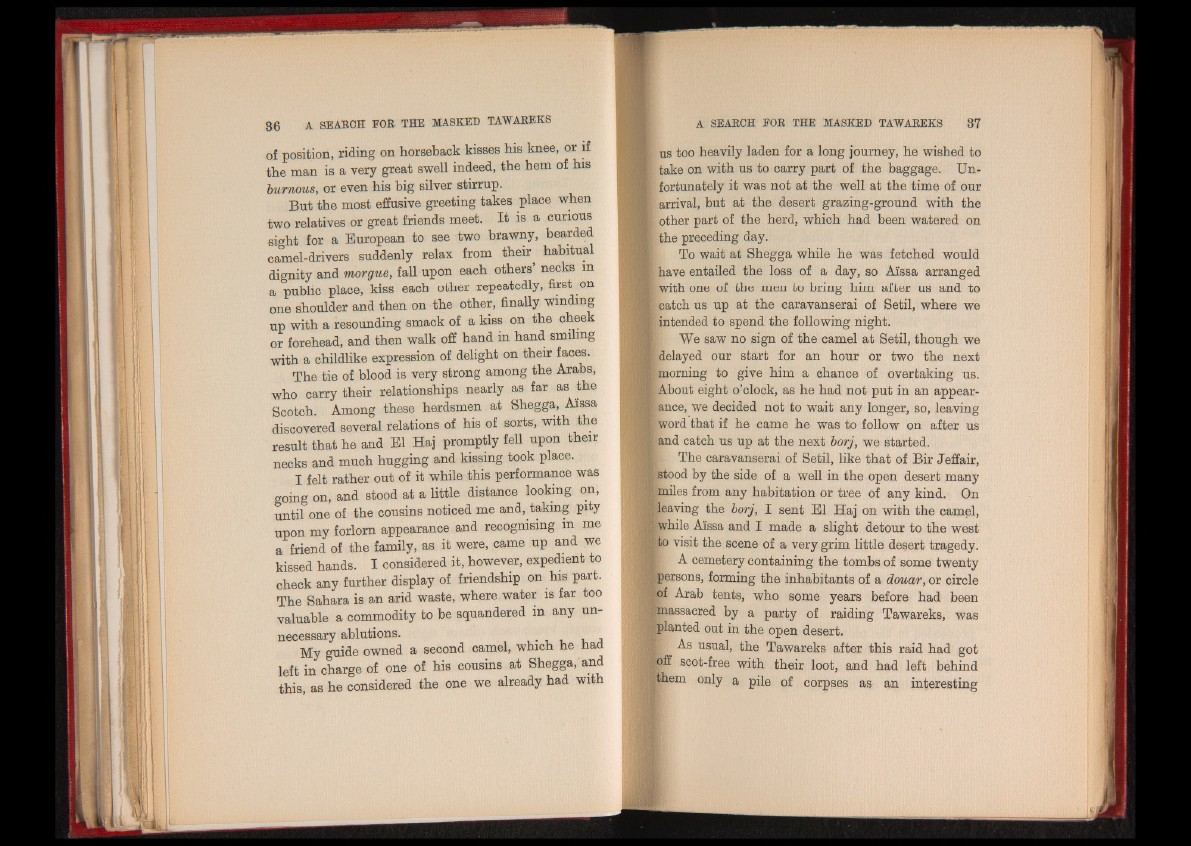
of position, riding on horseback kisses his knee, or if
the man is a very great swell indeed, the hem of his
burnous, or even his big silver stirrup.
But the most effusive greeting takes place when
two relatives or great friends meet. It is a curious
sight for a European to see two brawny, bearded
camel-drivers suddenly relax from their habitual
dignity and morgue, fall upon each others’ necks in
a public place, kiss each other repeatedly, first on
one shoulder and then on the other, finally winding
up with a resounding smack of a kiss on the cheek
or forehead, and then walk off hand in hand smiling
with a childlike expression of delight on their faces.
The tie of blood is very strong among the Arabs,
who carry their relationships nearly as far as the
Scotch. Among these herdsmen at Shegga, Alssa
discovered several relations of his of sorts, with the
result that he and El Haj promptly fell upon their
necks and much hugging and kissing took place.
I felt rather out of it while this performance was
going on, and stood at a little distance looking on,
until one of the cousins noticed me and, taking pity
upon my forlorn appearance and recognising in me
a friend of the family, as it were, came up and we
kissed hands. I considered it, however, expedient to
check any further display of friendship on his part.
The Sahara is an arid waste, where water is far too
valuable a commodity to be squandered m any unnecessary
ablutions.
My guide owned a second camel, which he had
left in charge of one of his cousins at Shegga, and
this, as he considered the one we already had with
us too heavily laden for a long journey, he wished to
take on with us to carry part of the baggage. Unfortunately
it was not at the well at the time of our
arrival, but at the desert grazing-ground with the
other part of the herd, which had been watered on
the preceding day.
To wait at Shegga while he was fetched would
have entailed the loss of a day, so Alssa arranged
with one of the men to bring him after us and to
catch us up at the caravanserai of Setil, where we
intended to spend the following night.
We saw no sign of the camel at Setil, though we
delayed our start for an hour or two the next
morning to give him a chance of overtaking us.
About eight o’clock, as he had not put in an appearance,
we decided not to wait any longer, so, leaving
word that if he came he was to follow on after us
and catch us up at the next borj, we started.
The caravanserai of Setil, like that of Bir Jeffair,
stood by the side of a well in the open desert many
■piles from any habitation or tree of any kind. On
leaving the borj, I sent El Haj on with the camel,
while Aissa and I made a slight detour to the west
¡to visit the scene of a very grim little desert tragedy.
A cemetery containing the tombs of some twenty
persons, forming the inhabitants of a douar, or circle
of Arab tents, who some years before had been
massacred by a party of raiding Tawareks, was
¡planted out in the open desert.
I t As usual, the Tawareks after this raid had got
off scot-free with their loot, and had left behind
Ihem only a pile of corpses as an interesting